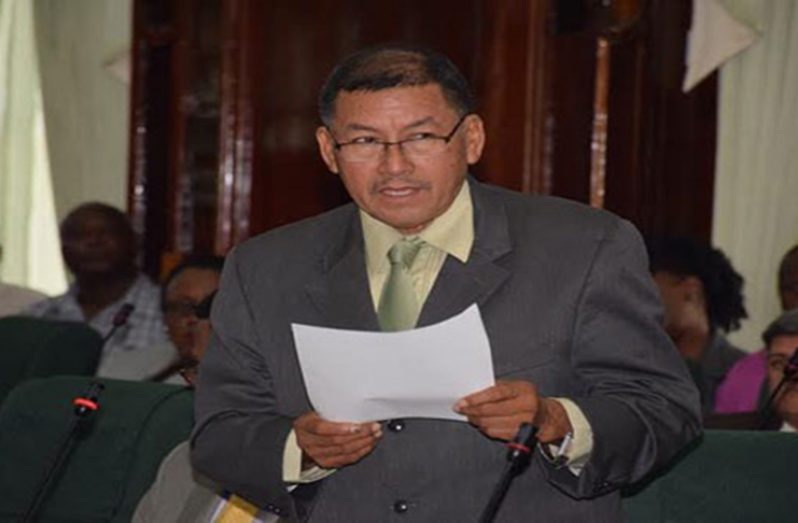– but rather what we do with the profits, Allicock warns House
THERE’S nothing stopping Guyana from prospering long after the oil is gone, says Minister of Indigenous Peoples Affairs, Sydney Allicock.
She has a wealth of opportunities and alternative industries at her disposal, from coconuts, to coffee, to tourism, and there are many options available to ensure the economy remains diversified and resilient in the aftermath of oil production, he said Thursday while members of both sides of the House tried to outdo each other in debating the merits and demerits of the 2019 Budget.
“I wish to remind everyone listening that the principles of the SDGs, GSDS and the ten-point plan will be also reflected in the use of proceeds from the oil towards the continued protection of the natural environment; through the development of educational facilities to impart to the nation and the world; the opportunity to discover undiscovered education of the hinterland by its teachers.”
He also made the telling observation that when it comes to oil, Guyanese ought not to be thinking in terms of what it can do for us, but rather how the country can position itself to make good use of the profits.
Noting that his ministry prides itself on having an open-door policy, Minister Allicock said it is this same principle that is applied whether dealing with Indigenous NGOs or the National Toshao Council (NTC), and continuously reflected in every successive Budget since the Coalition took office.
“This open-door policy is a huge part of the ministry’s daily work,” he said. “We’ve accommodated countless off-schedule meetings, because my ministry remains committed to assisting our hinterland people who are our priority…
“Just last month, a lease was presented to the NTC for a plot of land for their secretariat. This was done despite misconceptions by less than untainted leaders of the previous NTC, and despite lash-outs by the same on the government.”
With reference to a promise President David Granger made to the NTC, and his propensity to keep his word, Minister Allicock said:
“We promise; it came to realisation. We are working on even identifying a larger plot of land for the establishment of a complex that will enable the NTC to grow and achieve more during their tenure.
“That is the work of a government with a vision; a government that commits and follows through, despite political affiliations.”
He also spoke of the proposed Village Improvement Plans (VIPs) which seek to ensure that the government and other development agents deploy transformational investments that enable local and Indigenous Community-driven development.
These plans, he said, are essential to planning the paths to development and are designed to support Indigenous Peoples to improve their wellbeing by decentralising ‘green’ development to the local level.
Minister Allicock said that each Indigenous community will seek to develop their 10-year VIPs as well as their annual village plan, outlining their overall community vision, and their goals and targets under each programmatic area for the achievement of their vision.
Currently, he said, there are 38 villages that have completed their VIPs, 36 of which are in Region Nine (Upper Takutu-Upper Essequibo) alone.
He said that come next year, 25 additional villages will be completing their VIPs in Regions One (Barima-Waini), Seven (Cuyuni-Mazaruni), Eight (Potaro-Siparuni) and Nine.



.jpg)










